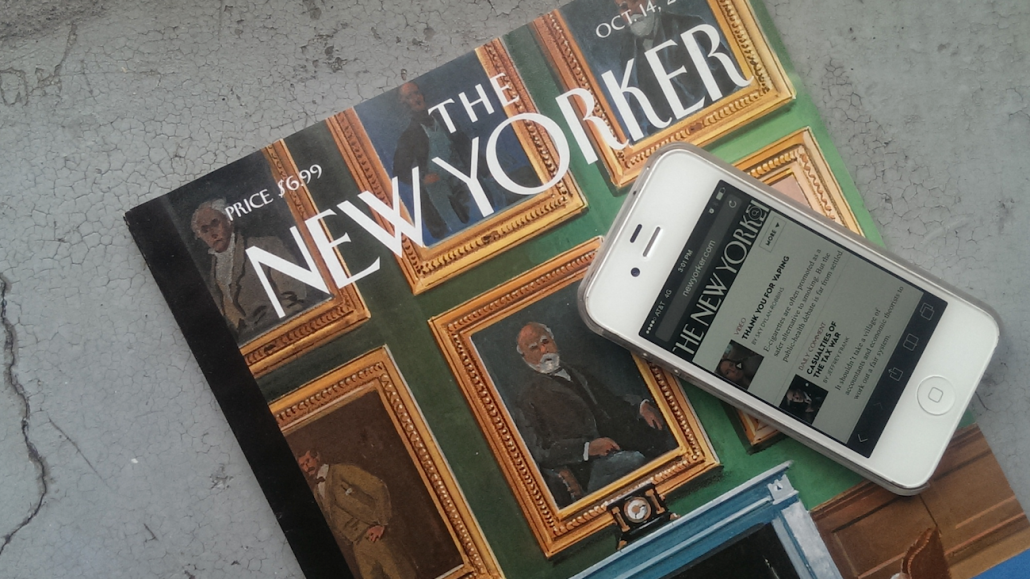Save 50% on a 3-month Digiday+ membership. Ends Dec 5.
The New Yorker Festival sees record ticket sales on its virtual pivot

This year’s seven-day long virtual New Yorker Festival, running from Oct. 5 to Oct. 11, so far has hit a record number of ticket sales for only 17 events, approximately a third of the number of sessions the festival featured last year.
Last year’s in-person version of the culture and conversation festival was three days long and pulled 20,000 attendees over the course of about 50 events, said Eric Gillin, Condé Nast’s chief business officer of the culture division. So far in 2020, that 20,000 number has been surpassed by the number of virtual tickets sold, but he declined to share the exact number.
This year’s The New Yorker Festival ticket prices for a single session are about 60% to 75% lower than what they were in 2019. The cheapest ticket this year is $19, compared to $49 or $79 for a single session ticket in 2019. About 50% of ticket sales came from existing subscribers who received 40% off their purchase.
Getting people to tune into a virtual event, let alone pay for one, is a challenge that many publishers are facing right now given the abundance of similar virtual events being rushed to market by publishers eager to recoup lost in-person programming revenue.
Indeed, according to Gillin, the reason for only doing 17 sessions was that there is a “noise problem” with the number of virtual events options and entertainment options available right now.
To differentiate, Gillin said there is focus on featuring unedited content from important public figures — such as actors and comedians Chris Rock, Maya Rudolph and Jerry Seinfeld — that are otherwise normally seen overly produced in television or on stage.
“We’re looking for ways to deeply engage with The New Yorker reader,” he said.
Ad position: web_incontent_pos1
Additionally, “we added a tactile component,” he said, including a session where meals were sent out to paying attendees who then tuned in for a related panel. Additionally, on Sunday October. 11, there is a drive-in in Queens, NY for local attendees to see the U.S. premiere of the movie “One Night in Miami…”
These elements are critical to getting audiences to pay for virtual or hybrid events, according to Eric Fleming, executive producer of experiential agency Makeout. Particularly “exclusivity” and a “swag-like experience” that audiences can take with them to help increase the likelihood of ticket sales by giving them something that feels substantial.
Ben Hindman, CEO of virtual events platform Splash, said in normal times, two-thirds of his clients with consumer-facing events have a ticketing component, but there has been a precipitous drop in the number of ticketed events and the revenue from ticket sales during the coronavirus crisis. And, he added, the events that do have tickets are charging a fraction of the price that they had been for live events.
Gillin declined to share revenue figures surrounding the festival but stated that the split between ticket revenue and sponsorship revenue stayed consistent from year to year. Additionally, the number of sponsors for the event are consistent with last year. This year’s four sponsors are Amazon Studios, Showtime, Mailchimp Presents and A.A.R.P.
Earlier this month, The New Yorker Union announced it was picketing a specific keynote event on the first night of the festival, which was a conversation between Senator Elizabeth Warren and Representative Alexandria Ocasio-Cortez. The virtual picket line was done in an effort to give the publication’s editorial staffers “just cause” when being let go from the company, without the caveat of broadly saying “violating editorial standards.”
Ad position: web_incontent_pos2
“We had tried to do so many things to get just cause” since May, said Natalie Meade, a New Yorker editorial staffer who also serves as a unit chair of the union. “We never got a response. This was the first time we were acknowledged when we picketed the event.”
Meade said that they chose to picket the event with Ocasio-Cortez and Warren because it was a tentpole for the festival that was expected to draw a significant crowd, but also because touting two progressive politicians who champion workers’ rights within their platforms felt hypocritical.
This session was thusly canceled and tickets were refunded when Ocasio-Cortez and Warren announced they would not cross the picket line, would have taken place on Monday night. After resolving the issue and granting the Union just cause for terminations, the event was once again rescheduled for Friday, Oct. 9 at 8 p.m.
Gillen would not disclose the number of tickets that were initially sold for that event in particular, however, the event that took place on Monday night with immunologist Dr. Anthony Fauci drew in a paying audience of more than 5,000, indicating that there was likely a substantial audience that would have tuned in. The ticketed event was priced at $19.
Tickets have been sold to people in all 50 states and from 50 countries, which is a new level of reach for the festival.
More in Media

What publishers are wishing for this holiday season: End AI scraping and determine AI-powered audience value
Publishers want a fair, structured, regulated AI environment and they also want to define what the next decade of audience metrics looks like.

Digiday+ Research Subscription Index 2025: Subscription strategies from Bloomberg, The New York Times, Vox and others
Digiday’s third annual Subscription Index examines and measures publishers’ subscription strategies to identify common approaches and key tactics among Bloomberg, The New York Times, Vox and others.

From lawsuits to lobbying: How publishers are fighting AI
We may be closing out 2025, but publishers aren’t retreating from the battle of AI search — some are escalating it, and they expect the fight to stretch deep into 2026.
Ad position: web_bfu



